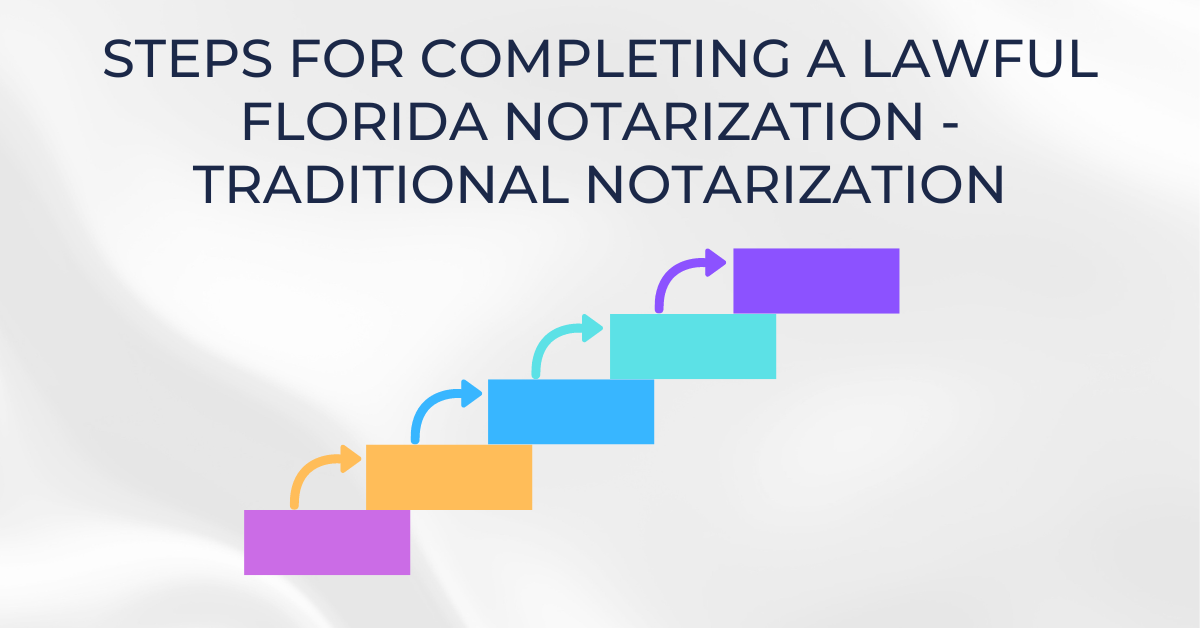
Revised 7/26/2024
Require the Presence of the Named Principal Signer
You must require the physical presence of the principal signer(s). If you are a RON (Remote Online Notary), the signer must appear before you via audio-video technology. There are no exceptions to this rule.
Identify the Named Principal Signer
Florida law requires a notary to use either personal knowledge or satisfactory evidence of identification.
- Personal knowledge is considered knowing a person over a period of time that would establish their identity with reasonable certainty.
- Satisfactory evidence is a document presented to the notary that is current or issued within the last 5 years and has a serial number, such as a driver's license, non-driver identification card, or passport. For a complete list of acceptable ID documents please click here: https://notaries.dos.state.fl.us/pdf/notrylaw.pdf (see page 4).
- If a signer does not have an identification document and is unable to obtain such documents, a Florida notary may use a credible witness(es) as identification. Florida allows the affidavit of one credible witness personally known to the notary and the signer OR two credible witnesses unknown to the notary who personally know the document signer and have an acceptable form of identification.
Confirm Awareness and Willingness
The notary must ensure that the signer understands the contents of the document and has signed it willingly. Never notarize the signature of someone who seems confused, unresponsive, or urged to sign against their will.
Examine the Document
There are a few key elements you must examine before proceeding with notarization.
- Check to be sure the document appears complete with all pages.
- If there are any blanks in the document, address them with the signer to complete them in some way, or check with the document originator for advice on how to complete them. "For Office Use Only" blanks are just for that and can usually be left blank.
- Remember, the document and signature dates must be the same day or before the date of notarization. (NOTE: An acknowledgment does not have to be signed in the presence of the notary and may be signed before the notarization. If the notarial act is an oath/affirmation, the signer must sign the document in the notary’s presence at the time of notarization.)
- Be sure the notarial certificate complies with Florida statutes. The certificate is the part that you, the notary, are completing about the facts of the notarization. The certificate must include the state and county where the act is physically taking place, the date of notarization, who appeared before you, how they appeared either in physical presence or audio-video communication technology (If you are a RON notary), and how you identified the signer. (NOTE: If the notarial certificate is missing, please see this helpful blog, What to Do When the Notary Certificate is Missing)
Discuss Fees
Before proceeding with the notarization, discuss your fees. Remember, Florida law allows a notary to charge $10 per notarial act and $30 for performing a marriage ceremony. If you have any additional fees, such as time and travel, discuss those fees upfront and provide an itemized receipt of those additional fees.
Complete the Notarial Act
Now that all the steps above are complete, proceed with the notarial act. Have the named principal present their identification, sign the document in your presence (if it is an acknowledgment, it can be signed prior to the notarization), administer the verbal ceremony, and complete the notarial certificate.
If you are in doubt about any of the steps above, decline to perform the notarization. You may not give legal advice regarding the legality of a document and/or its consequences.
Related Article(s)
Can I Notarize When the Person Has No ID?
What to Do When the Notary Certificate Is Missing?
What Should I Do When There's No Room for My Notary Stamp?
